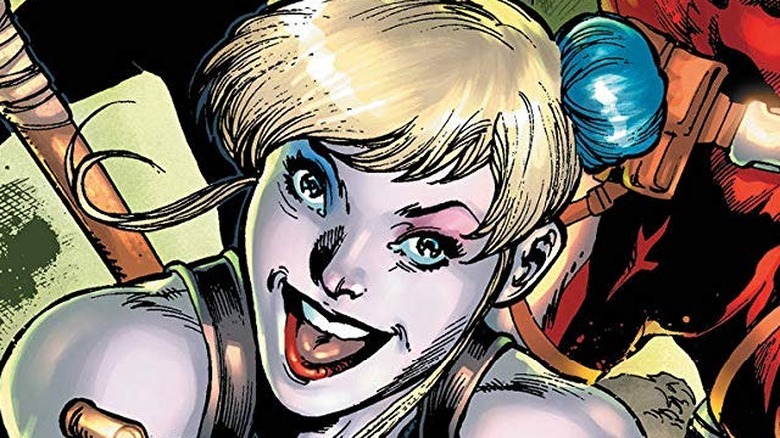
One of the most unique qualities of DC's Suicide Squad is its hilariously expendable roster. In an era in which every hero is contractually obligated to fight another day, here stands a group of supervillain misfits whose every breath could be their last. James Gunn lived up to the promises he made before the release of "The Suicide Squad," mowing down most of the members with creative carnage.
The cacophony of casualties the Squad faced during its excursion to Corto Maltese left plenty of open spots, waiting to be filled by other Belle Reve inmates. You don't need much to be part of the team: an irredeemable criminal record, a gimmick that'll help you stand out in a crowd, B-list status, and that's pretty much it. With those qualifications in mind, the following 10 DC supervillains are strong candidates to join Amanda Waller's ragtag array of murderers, monsters, and Margot Robbies.
Calendar Man
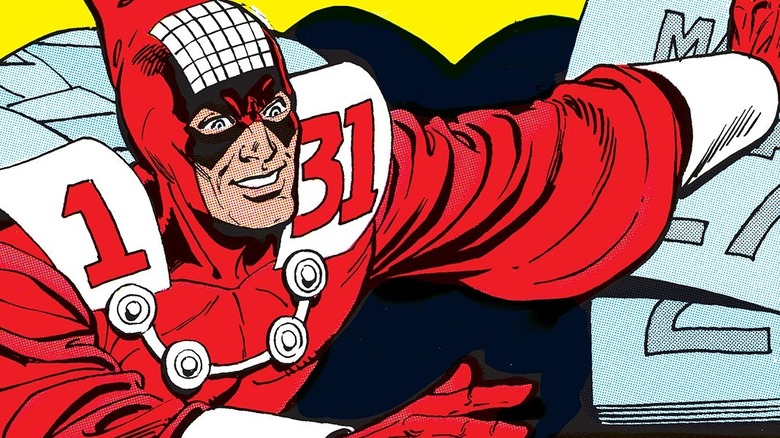
Once you get past the big names, Batman's infamous rogues' gallery gets pretty weird -- Kite Man, Condiment King, and "The Suicide Squad" breakout star Polka-Dot Man are all part of this little league of oddballs. The second-tier Bat villain with the most history is Julian Gregory Day, known among the Gotham populace as Calendar Man. Originally a silly one-off villain in the Golden Age, Calendar Man rose to prominence when he played a substantial part in the fan-favorite Batman story "The Long Halloween," where he was reimagined as a Hannibal Lecter-esque serial killer who only carries out his work on significant dates, like holidays.
Including Calendar Man in a sequel to "The Suicide Squad" makes sense since he's already been established as a Belle Reve inmate in the DCEU (the more modern version of the character makes a quick cameo in the opening act of "The Suicide Squad"), but general audiences may have trouble wrapping their minds around the fact that a serial killer named himself after one of the least threatening objects in existence. The solution is simple: throw Calendar Man in his incredible Silver Age costume -- all red, with literal calendars attached -- keep the super-serious demeanor of the more modern interpretation, and watch the sparks fly.
Matches Malone
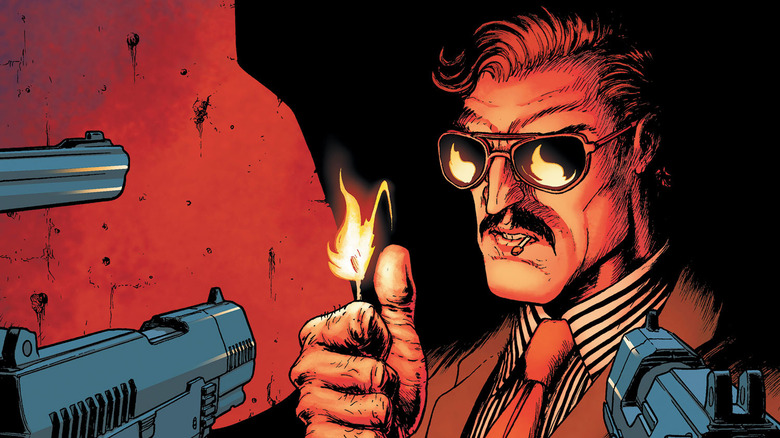
One of the few characters on this list without any previous Squad affiliation, Matches Malone epitomizes the average Gotham gangster. Apart from the fire starter between his teeth, Matches doesn't have much: he's not a genius-level intellect, he doesn't have deadly combat skills, and he has no staying power among the city's mob families. In fact, his most significant contribution to Gotham's contemporary crime history is that his name and likeness have been "borrowed" by a certain Bat-loving vigilante, who uses Matches' identity to infiltrate the city's criminal underbelly.
Matches' stolen identity is, ironically, his standout distinction -- his "unique" relationship with the Dark Knight sets him apart from more prominent mobsters like Carmine Falcone or Joe Chill. His central conceit in the Suicide Squad would be his criminal record -- his actual crimes, robbery and arson, feel petty in comparison to Matches' rumored charisma and sharp mind, both products of the World's Greatest Detective's masquerade. Who are you supposed to be if all of your most memorable moments came from someone else?
Livewire
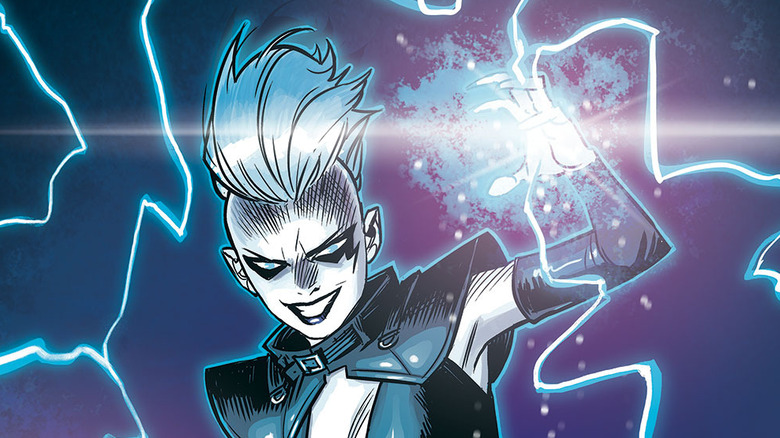
Modern DC fandom owes a lot to the DC Animated Universe of the '90s and early '00s. The continued adoration for DC's interconnected cartoon universe is most plainly seen in the Suicide Squad's most popular member, Harley Quinn, who debuted in "Batman: The Animated Series," the DCAU's first and most popular show.
But Harley's not the only character created by Bruce Timm, Paul Dini, and the rest of the artists and animators at Warner Bros. Animation to make an impact in the comics. "Superman: The Animated Series" introduced Leslie Willis, a shock-jock radio host based in Metropolis who antagonized Superman until she was struck by a lightning bolt infused with the Man of Steel's essence. She became Livewire, a ghostly metahuman wielding immense power over electricity. Though Livewire hasn't seen the same success as Harley in the years following her debut, Ms. Willis has made her way to the mainline DC comics universe and into several live-action shows, including The CW's "Supergirl."
An on-the-fly agitator like Livewire is a perfect fit for the middle-finger sensibilities of the Suicide Squad. As a character created in the late '90s, when media firebrand Howard Stern dominated American talk radio, her original background would fit nicely with the group's general dynamic, albeit with some updating for the age of Joe Rogan. Livewire could juggle lightning while ranting about "snowflakes" and "safe spaces," like almost every other talk radio host these days.
The Talon
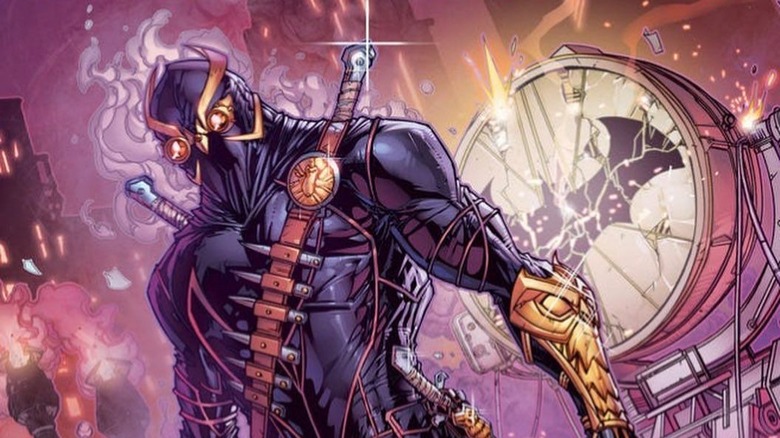
The Court of Owls is one of the most popular Batman adversaries of the 21st century. Although Gotham's secret society has been hiding in the city's shadows for centuries, it was only brought to light a decade ago, in the opening act of Batman's first "New 52" arc. In the years since, the Court has caused all kinds of trouble for Bruce, enrapturing Batfans with its textured history and delightfully creepy iconography. In order to keep its operations secret, the Court deploys lethal assassins known as the Talons to tie up loose ends and prevent potential exposures. One is William Cobb, considered the most dangerous Talon of the bunch.
One of the Court of Owls' more underappreciated qualities is its versatility. Sure, the Owl-luminati are suitably unsettling in their deadly demand for secrecy and social control, but the organization is also full of classic conspiracy nonsense. A secret society controlled by people in owl masks, with names based on owl wordplay? Cobb's twist as a Suicide Squad member would be his dubious origins, insisting that the Court of Owls is absolutely real, even if the rest of the squad doesn't believe it for a second. Given that Cobb's on the older side (over a century and counting!), it's entirely possible he left his sanity behind long ago.
Magpie
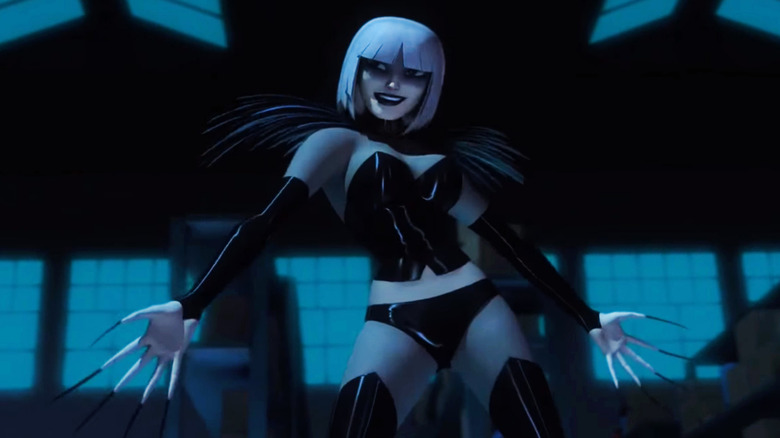
Not all Suicide Squad members are created equal. For every Deadshot or King Shark, there are three Blackguards and a Weasel standing next to them. But that doesn't mean those with less power have inherently less to contribute. Few villains prove that principle better than Gotham Z-lister Magpie. On paper, Margaret Pye is almost laughable as a villainess. She's a thief who can grow her nails cartoonishly long. That's it. It's not all bad, though -- sometimes, they're poisonous!
But a simple description of Magpie's powers does the underrated baddie a serious disservice. Magpie is a sleek and stylish supervillain with a penchant for technology and a thirst for only the most exquisite jewels. Despite her exceptionally memorable look, she's rarely been seen in Batmedia (her foremost appearance in any animated property is the oft-forgotten 2013 series "Beware the Batman"), although her recent appearances in "Gotham" and "Batwoman" have resulted in more attention from fans and creators. The logical next step for this budding supervillain is some screen time on the Squad, maybe to see if audiences would respond well to a Batman movie featuring Magpie as the central antagonist.
Zebra-Man
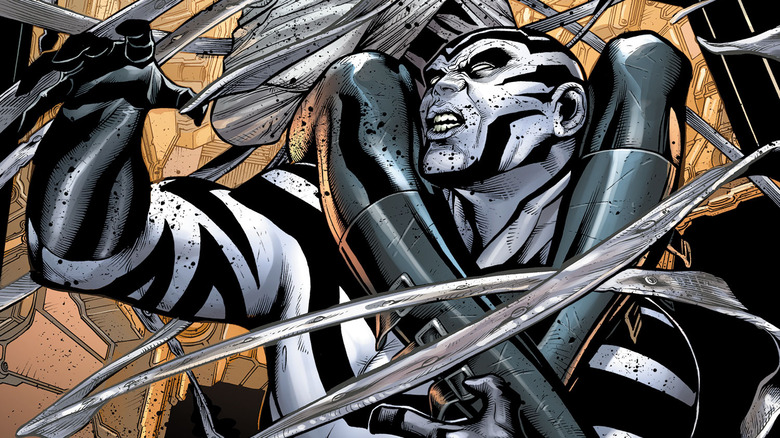
One of the primary functions of "The Suicide Squad" as a part of a cinematic universe is its role as a supervillain dumping ground. No matter how successful the DC Extended Universe becomes, villains like Savant, Weasel, and Polka-Dot Man will never be bigger than Darkseid, Brainiac, or the Joker. In that respect, no one fits the Squad better than Dr. Jacob Baker, a scientist whose creations irradiated his body, giving him permanent scars that resemble a zebra's stripes. Zebra-Man, as he came to be known, battled Batman using his mastery of "diamagnetism" (push-and-pull control over anything that isn't metal) before the Dark Knight "diamagnetized" him to the Gotham City Police Department. Truly, an untouchable legacy.
Dr. Baker doesn't have a lot going for him. His powers are limited, his gimmick is silly, and he barely has any existing history with DC's roster of do-gooders -- in other words, he exemplifies everything that makes the Suicide Squad such a fun concept. Zebra-Man is so underqualified, he's almost overqualified for a spot on the Squad.
Cheetah
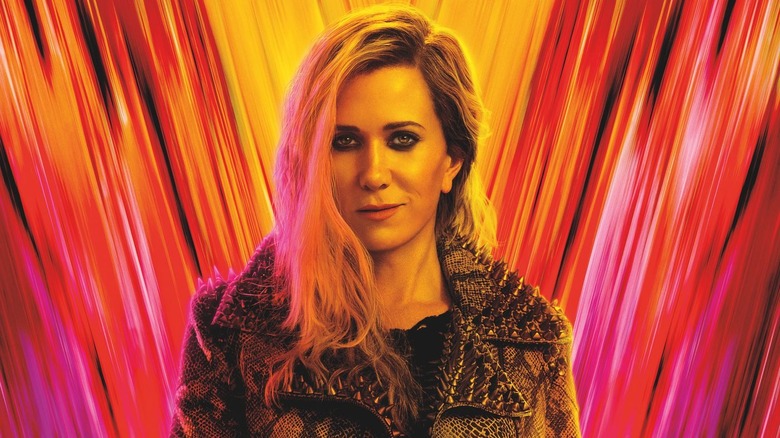
Eight years in, the DC Extended Universe hasn't built up the same level of trust with audiences as the Marvel Cinematic Universe has, but with fewer commitments to canon comes more creative freedom -- any DCEU character can stop by any DCEU production, and their appearance won't demand many mental gymnastics from movie-goers. One such example is Cheetah, the secondary antagonist from 2020's well-made disaster, "Wonder Woman 1984," played by Kristen Wiig.
Thanks to her much-maligned film's reception, Barbara Minerva isn't exactly a hot commodity, but "Wonder Woman 1984" gave Cheetah an open-ended finale, and it's likely she'll be seen again in the upcoming third "Wonder Woman" film. But why resign her to just one franchise? Cheetah is a celebrated villain in the DC Universe, and her powerset in "WW84" showed she is capable of going up against a half-god without being completely overwhelmed. Cheetah would be a colorful addition to the Squad, and would add a handy helping of star-power thanks to Wiig.
Cavalier
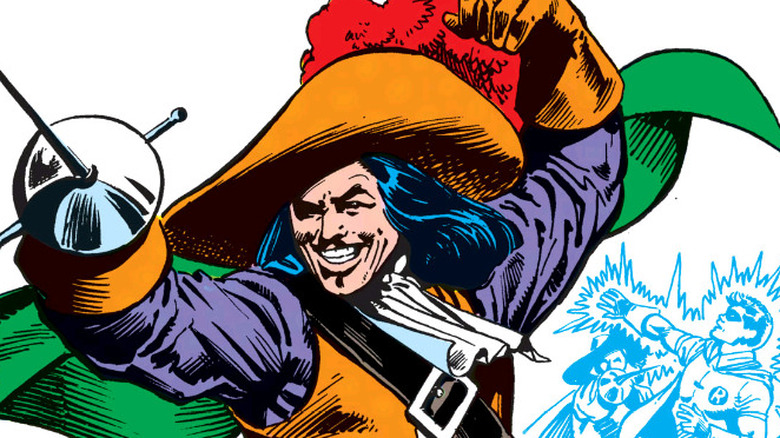
Who doesn't love a LARPer? Mortimer Drake was a simple man with complex tastes, down on his luck when he couldn't buy a few exotic valuables for his exuberant collection. Like any resident of the DC Universe, instead of finding legal means to achieve his goals, Drake donned a costume and stole the items himself, christening himself "the Cavalier" in the process. Given that the Dark Knight was influenced by classic European fiction like "The Scarlet Pimpernel," it makes sense that a member of his rogues' gallery would dress like a rejected Musketeer.
The Suicide Squad is jam packed with characters of all kinds, but what it lacks is someone committed to a character of his own. Cavalier indulges in the high-flying theatrics his costume personifies. This is not simply a man in swashbuckling attire. This is a man who takes his gimmick to its extreme. Cavalier is even known for the occasional act of heroism, such as literally helping an elderly woman cross the street. He's the kind of eccentric who would bounce off the Suicide Squad's normally cynical demeanor with hilarious results.
Merlyn
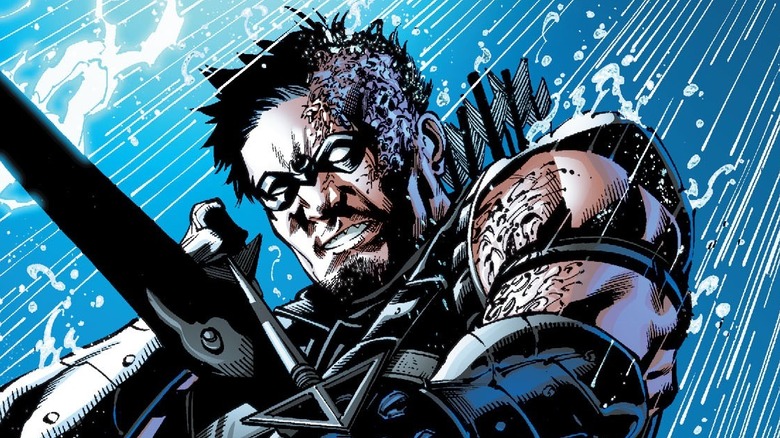
There's something to be said about the reputation an organization like the Suicide Squad has in its own universe. It's possible that other villains see the Squad as a bunch of small-timers who aren't important enough to be genuine threats on their own. Therefore, what if a supervillain with slightly more clout and history was delegated to the Squad against their will? After all, there's nothing worse than a member of a group who staunchly believes they're too important to be there.
Enter Merlyn, generally considered the archenemy of Oliver Queen, the Green Arrow. Also known as the Dark Archer, Merlyn has gone toe-to-toe with many of DC's finest, and has a far more extensive comic book history than most potential Squad members. Supervillains are not known for their humility, and adding a character who serves as the recurring nemesis of a well-known DC hero to the Squad would bring out some serious egotism, as well as fears of inadequacy. Merlyn definitely isn't "too big" for the Suicide Squad, but he probably wouldn't agree.
Duela Dent
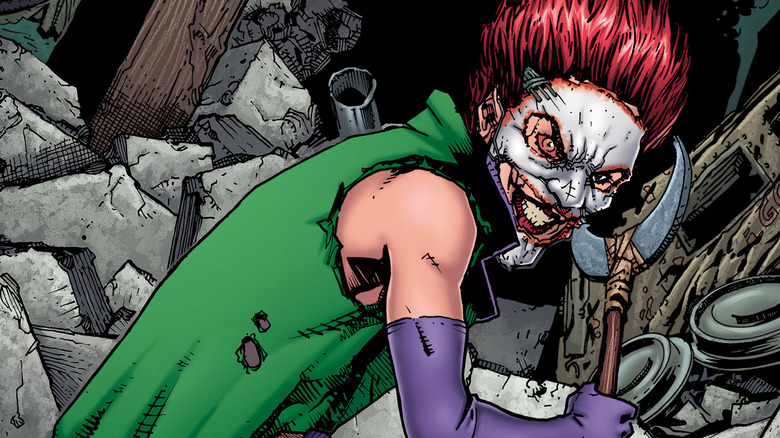
Secret identities were once an irreplaceable part of superhero mythology (and superhero movies). But, in a post-"I am Iron Man" world, they don't seem to matter much outside of DC's big three (Superman, Batman, and Wonder Woman). Bringing the once-unshakable trope back to the forefront would be Duela Dent, who has claimed to be the daughter of the Joker, the Penguin, the Scarecrow, the Riddler, and even Catwoman. It soon became clear this girl was using multiple cover stories, and even though she took the name "Duela Dent," implying that she is the daughter of Harvey "Two-Face" Dent, she's actually too old to fit that description. So, who is this girl?
Regardless of her true origins (which have yet to be revealed, 45 years after her debut), a character role-playing as the offspring of several of Gotham's greatest threats is an excellent concept for a member of the Suicide Squad. With abilities befitting her multiple (fake) origin stories, Duela would try to shock and impress the rest of the Squad by revealing her heritage over and over -- with different results each time. Duela would struggle to keep her story straight, leading to both comedic moments and a thematic exploration of identity and self-acceptance.
Read this next: Every 'The Suicide Squad' Character Ranked By How Much You Want To Hug Them
The post 10 DC Comics characters we'd like to see in a Suicide Squad sequel appeared first on /Film.
from /Film https://ift.tt/3gDpPUF
via IFTTT
Comments
Post a Comment